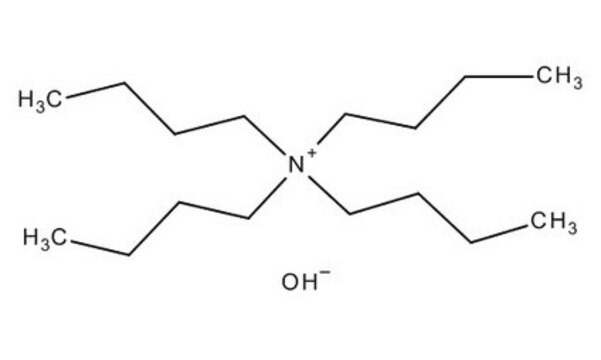87993
Tetraoctylammonium hydroxide solution
~20% in methanol (T)
Synonym(s):
Tetra-N-octyl ammonium hydroxide
About This Item
Recommended Products
form
liquid
Quality Level
concentration
~20% in methanol (T)
anion traces
bromide (Br-): ≤500 mg/kg
functional group
amine
storage temp.
2-8°C
SMILES string
[OH-].CCCCCCCC[N+](CCCCCCCC)(CCCCCCCC)CCCCCCCC
InChI
1S/C32H68N.H2O/c1-5-9-13-17-21-25-29-33(30-26-22-18-14-10-6-2,31-27-23-19-15-11-7-3)32-28-24-20-16-12-8-4;/h5-32H2,1-4H3;1H2/q+1;/p-1
InChI key
DCFYRBLFVWYBIJ-UHFFFAOYSA-M
Looking for similar products? Visit Product Comparison Guide
Related Categories
Application
- A lipophilic base in the study of its effect on optical pCO2 sensors.
- A lipophilic organic base in the preparation of nanobeads, which are used as sensors for the detection of acidic and basic gases.
- A starting material for the preparation of ionic liquid named tetraoctylammonium 2-methyl-1-naphthoate, which is used in the extraction of 2,3-butanediol from H2O.
Other Notes
Signal Word
Danger
Hazard Statements
Precautionary Statements
Hazard Classifications
Acute Tox. 3 Dermal - Acute Tox. 3 Inhalation - Acute Tox. 3 Oral - Eye Dam. 1 - Flam. Liq. 2 - Skin Corr. 1B - STOT SE 1
Target Organs
Eyes,Central nervous system
Storage Class Code
3 - Flammable liquids
WGK
WGK 3
Flash Point(F)
51.8 °F - closed cup
Flash Point(C)
11 °C - closed cup
Personal Protective Equipment
Choose from one of the most recent versions:
Already Own This Product?
Find documentation for the products that you have recently purchased in the Document Library.
Customers Also Viewed
Our team of scientists has experience in all areas of research including Life Science, Material Science, Chemical Synthesis, Chromatography, Analytical and many others.
Contact Technical Service













